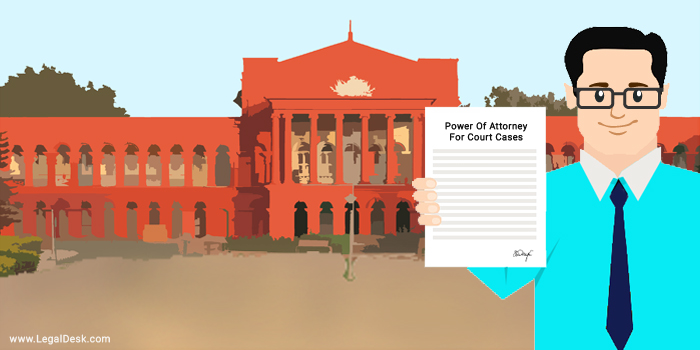General Power of Attorney (GPA) for court cases is a document that empowers a person to appear on behalf of another person for matters related to court cases. It is typically used for the following scenarios-
- Submit cases to lawyers/legal personnel on behalf of the Principal/ Grantor
- Sign documents concerning court cases on behalf of the Principal/ Grantor
- Carry out acts or deeds directly relating to court cases
- File FIR/complaints to relevant authorities
- Depose for evidence or give statements
- Enter into settlements of cases or compromises
In general, a GPA for court cases can empower the Attorney to appear on behalf of the Principal for all matters related to court cases, if so deemed by the GPA document.

How To Create A Power of Attorney For Court Cases?
A Power of Attorney is a written document wherein the “Principal” confers rights and legal authority on the “ Attorney” to do certain acts and take appropriate decisions in legal matters.
Apart from the “Attorney” being responsible for his individual acts, the “ Principal” would also be responsible for the acts done by the “Attorney”.
Like any power of attorney document, GPA for court cases too can be drafted on a plain white paper with details of the Principal, the Attorney and the nature of the powers being described in detail. The document must be notarized to authenticate the details on it.
In case you are unsure, we encourage that you use one of our pre-drafted templates that are lawyerverified to create a GPA for court cases.
What Should Be Included In The Document?
A typical power of attorney would contain the following facts –
- Date and place where the document was made
- Details of Principal – name, age, address
- Details of Agent – name, age, address
- Reasons for making the power of attorney – old age, living abroad, illness or any other disability
What powers can be conferred upon the “Attorney”?
- Institute and defend cases in lower courts, appellate courts, High Court, Supreme Court, tribunals, forums, appellate bodies etc
- Submit Vakalatnama, documents, evidences, statements, declarations, etc before appropriate authorities/court/police authorities.
- Accept written statements, counter statements, counter claims etc
- Enter into any compromise, settlement of case and accept and pay money in furtherance of such compromise/settlement.
- Depose for evidence, give statements, produce documents for evidence
- Engage advocates/solicitors/consultants/law firms
- File revision/appeals/review in the appropriate courts
- File FIR/complaints before competent authorities
How To Make It Legally Valid And Enforceable?
- Both the “Principal” and “Attorney” should be of sound mind and fully capable of understanding their actions.
- Should contain the signatures of “Principal” and “Attorney”
- Should contain the signatures of 2 competent witnesses
- To be executed on a Stamp paper of appropriate value depending on the State in which it is made. It need not be registered unless it concerns immovable property.
- Several copies can be made and stored, the original can be retained by “Principal” while the “Attorney” saves a copy too.
Thus, a power of attorney is an important document wherein the “Attorney” is entrusted with many confidential and trustworthy matters. He has to act in utmost good faith and exercise reasonable care in carrying out his duties as an attorney who is an authorised representative of the Principal.
Create With LegalDesk
LegalDesk caters to all your legal document needs, that too at compelling prices. You can create your GPA with us by simply filling in your details into a pre-drafted legally valid form. What’s more? You can even get it printed on Stamp paper of recommended value and have it delivered to your doorstep. Where else can you create a GPA for court cases from the comfort of your home? Go ahead, try it now!

